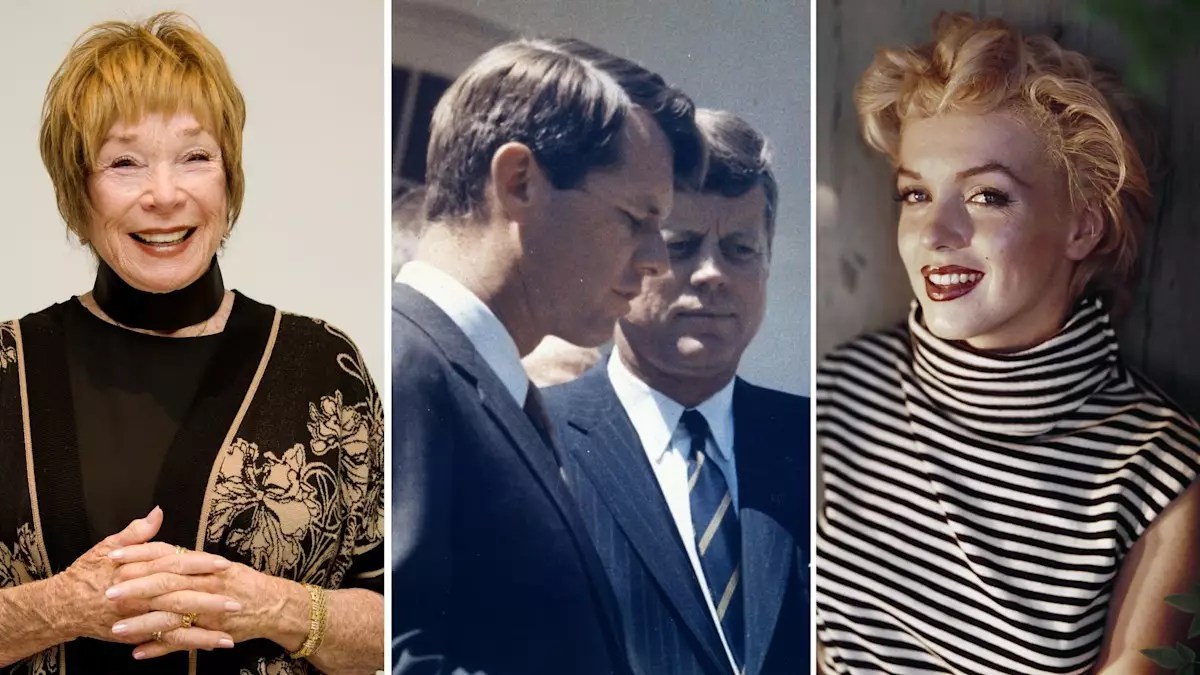The interplay between President John F. Kennedy, Hollywood icon Marilyn Monroe, and the enigmatic Shirley MacLaine has drawn interest for decades, fueled by rumors, whispers, and conjectures. The latest revelations from MacLaine’s recent book, *The Wall of Life: Pictures and Stories from this Marvelous Lifetime*, provide a new perspective on this notorious love triangle that continues to captivate the public imagination. By mixing personal anecdotes and historical events, MacLaine invites a deeper exploration into the lives of these significant figures.
The well-documented affair between John F. Kennedy and Marilyn Monroe has been the subject of numerous documentaries, books, and cinematic interpretations. Yet, MacLaine adds a twist to the narrative by claiming to have witnessed Bobby Kennedy entering a bedroom just after his brother left it, thus intertwining the lives of these two influential brothers with Monroe in a dramatic fashion. The claim raises eyebrows not just because it connects Bobby romantically to Monroe but also because it suggests a continuum of secrecy and betrayal among elite circles with often far-reaching consequences.
In her book, MacLaine not only recalls the event but also juxtaposes it with the famed celebration of JFK’s 45th birthday at Madison Square Garden in 1962, a night forever etched in history due to Monroe’s sultry rendition of “Happy Birthday.” This performance was not just a showstopper; it was a culmination of romantic and political intrigue that played a role in the personal lives of the individuals involved. Such a significant moment in pop culture provides a backdrop against which MacLaine’s account takes on added weight.
MacLaine’s insider perspective highlights an often-unseen dimension of celebrity and political life in the early 1960s, reflecting the complexities surrounding fame and power. When she recounts the scene with a photograph capturing JFK in the background, the implications of her statement amplify the feelings of nostalgia and tragedy associated with these figures. Monroe’s life ended abruptly less than three months following the fateful birthday celebration, which serves as a haunting reminder of the fleeting nature of both fame and human relationships.
In sharing personal moments like these, MacLaine provides readers with not just an insider look into the life of the Kennedys but also a commentary on the moral ambiguities faced by those in power. The latent theme of complicity emerges as she humorously narrates her encounter with Ted Kennedy, suggesting that even those close to the Kennedy brothers were keenly aware of their escapades. The laughter that ensued in recounting these moments serves as a complex response to the darker undertones of their lifestyles.
At 90, Shirley MacLaine’s career has been diverse, encompassing film, television, and balancing a keen interest in spirituality. Her latest memoir marks a shift in focus from existential explorations to principal narratives and photographs from her life. By sharing insights into her childhood and her relationships with Hollywood’s male leading figures, MacLaine breaks new ground in revealing the complexities of her own life intertwined with legends of the past.
Interestingly, MacLaine reveals in her memoir a time when she “propositioned” Morgan Freeman, adding a delightful layer of personal whimsy to her narrative. This playful yet intimate revelation indicates her no-holds-barred approach to storytelling, aligning her personal experiences with wider themes of love and rejection that permeate the Hollywood landscape. MacLaine’s reflections on her on-screen romances, particularly highlighting her bond with Jack Lemmon—characterized as brotherly—further humanizes her, presenting her as not just an icon but as someone navigating the labyrinth of relationships in their myriad forms.
The interplay between political power and celebrity status illustrated in Shirley MacLaine’s new book reveals not only the allure but also the darker ramifications of fame. JFK, Marilyn Monroe, and Bobby Kennedy remain enshrined in American culture, their stories intertwined in intriguing, often tragic ways. MacLaine’s candid storytelling offers us a window into this complex milieu, blending nostalgia with critical reflection as the boundaries between personal lives and public personas blur yet again. Her memoir is not merely a collection of memories; it serves as an insightful exploration into the entangled lives of influential figures whose legacies continue to incite curiosity and speculation.


Leave a Reply